Piolets d'Or Announces the "Significant Ascents" of 2023
This list of 68 climbs is effectively a "long list" used to select nominees of the prestigious alpine award.
Crossing 16 timezones, sleeping in airplanes, and changing in airport bathrooms, Becca Pizzi has won 7 marathons in 7 days on 7 continents, and she's done it 2 times. Becca is the Hero Next Door.

Heroes matter to us because their stories show us the horizon of human possibility. They remind us who we can become. For her hometown, Becca Pizzi is the hero next door, someone simultaneously familiar and extraordinary. But she is also a quintessential heroine for amateur runners everywhere. She has run (and won) 7 marathons in 7 days on 7 continents. Twice.
The event is the World Marathon Challenge, and it is as bold and daring as it sounds. It is the ultimate test of stamina, mental commitment, and geographical curiosity. Competitors run a marathon in Antarctica, Africa, Australia, Asia, Europe, South America, and North America within seven days. Arranged in collaborations between the WMC team and locally-based organizations, each marathon begins when the participants step off onto the next continent, cutting through time zones and circadian rhythms. Becca currently holds the record for women with 6 days, 7 hours, and 58 minutes.
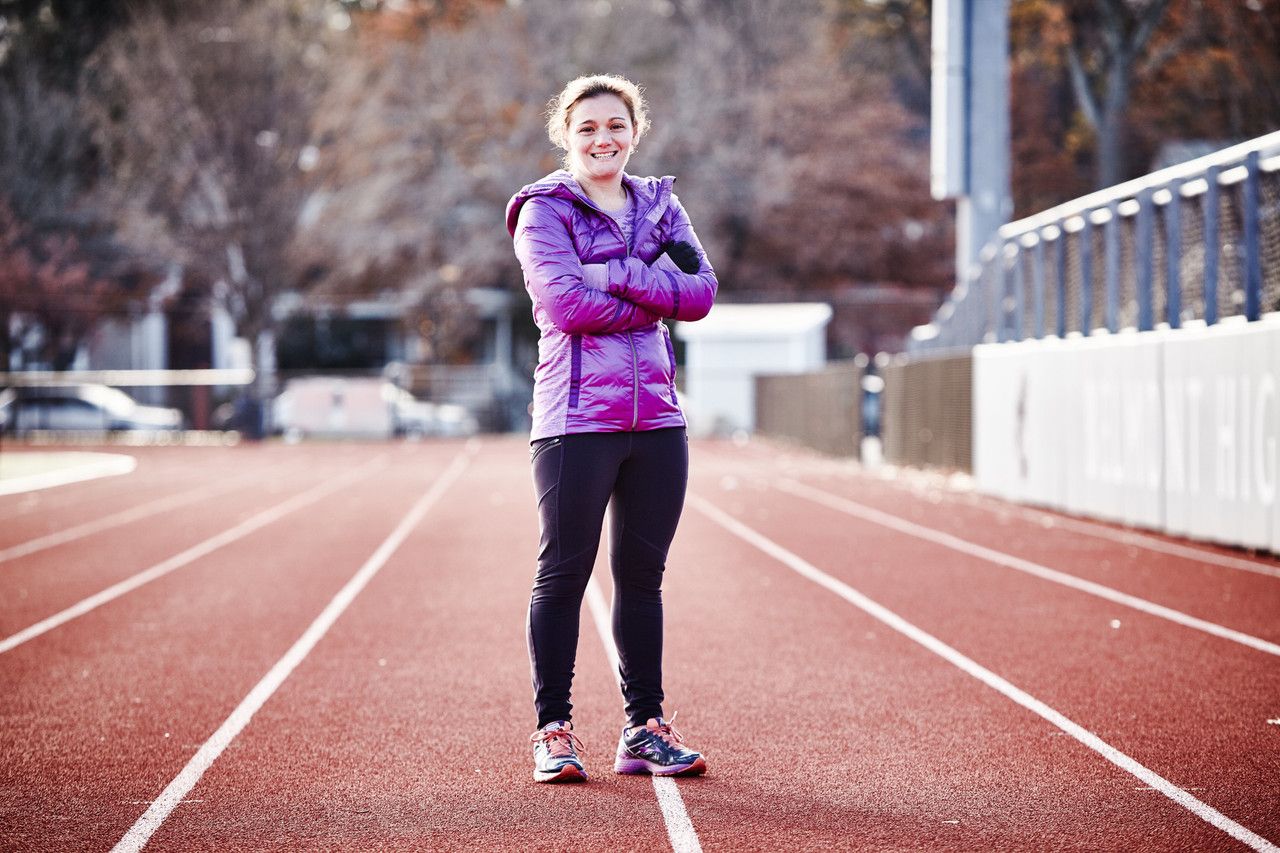
Joseph Campbell, one of the most famed mythologists of all times, once pointed out that the most heroic of acts was discovering who you were and who you wanted to be. Becca always knew who she was. Her dad taught her to run at the age of six. He was a Marine, and ‘being raised by a Marine, you are tougher than you want to be’, as she puts it. Becca still draws upon her upbringing. She finishes everything she starts. She owns a daycare center, manages an ice cream shop, raises a child, and does not miss her runs, unless Taylor, her daughter, gets sick. She finds a lack of self-discipline in others difficult to relate to.

Becca was born in Belmont, Massachusetts. Belmont is a model New England town, with redbrick houses and a deeply-rooted local community. This is where Becca started running. Pretty much everybody in Becca’s family runs. Her daughter started running at about the same age as she did. Her uncle ran his first marathon three years ago. Her husband is a runner as well. Fittingly, they met at the Boston Marathon Jimmy Fund Walk.
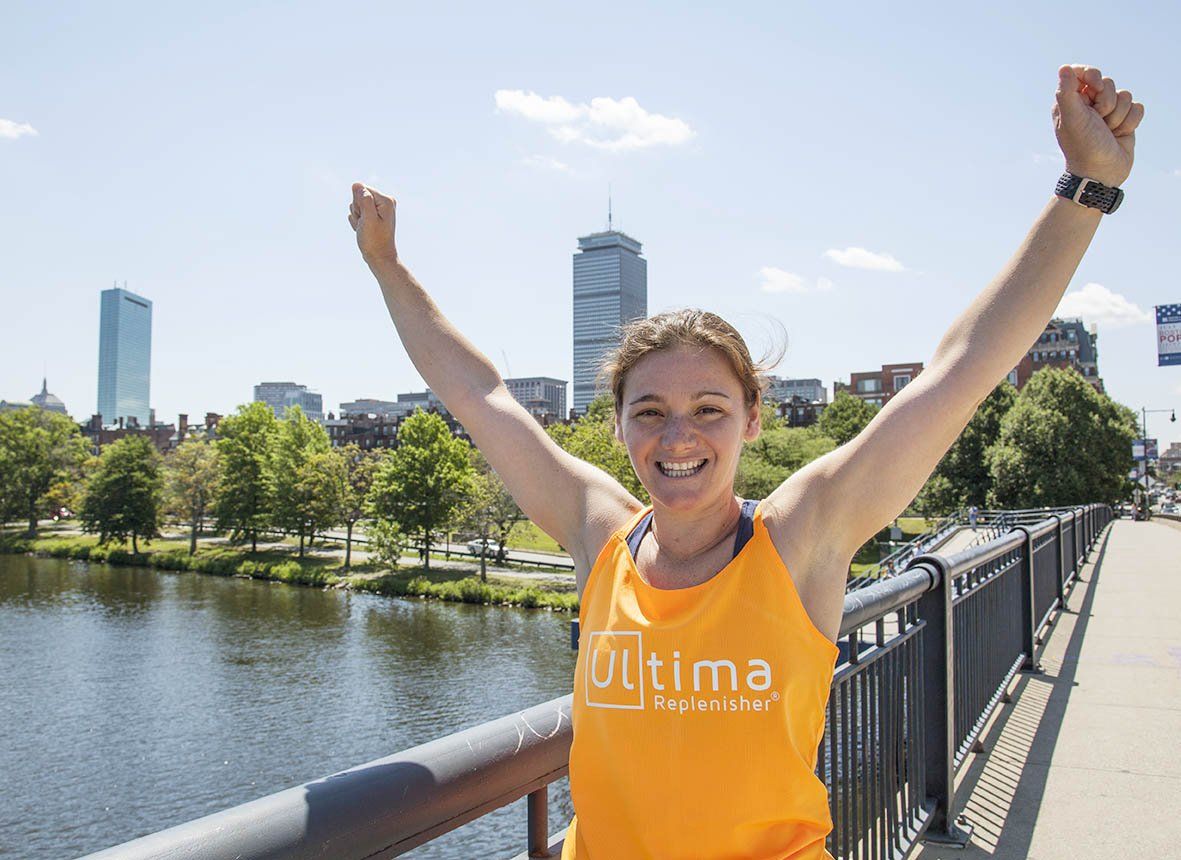
'being raised by a Marine, you are tougher than you want to be’
Being a running family is easy in Massachusetts – the whole state is one big running club. Harvard students sprint past the Charles River. Every town has its own race. Boston Marathon’s Heartbreak Hill, a gruesome ascent in Newton, probably has had more cumulative elevation gain done by runners than any other hill in the world. ‘I don’t know if I would be the runner and the person I am today if I hadn’t grown up in Boston’, Becca says. She does stadium runs at Harvard University, trains with Boston Bulldogs Running Club, and also with a number of other clubs, teams, and groups.
Becca says you are stronger when you have people to work out with. You want to make each other proud, and you want to inspire each other and not let anybody down. Running together also makes companionship surprisingly simple. They run, you run. Take the same route, and you are friends.

In 2015, the WMC was calling to Becca from everywhere. She was already thinking about it when friends started sending her the link. ‘It’s all you!’, they said. Becca felt it was her chance to make history. After all, she had been preparing for it her whole life. She ran her first marathon (the Boston Marathon, of course) at 17, the youngest person on the course. By 2015, she had about 50 marathons under her belt.
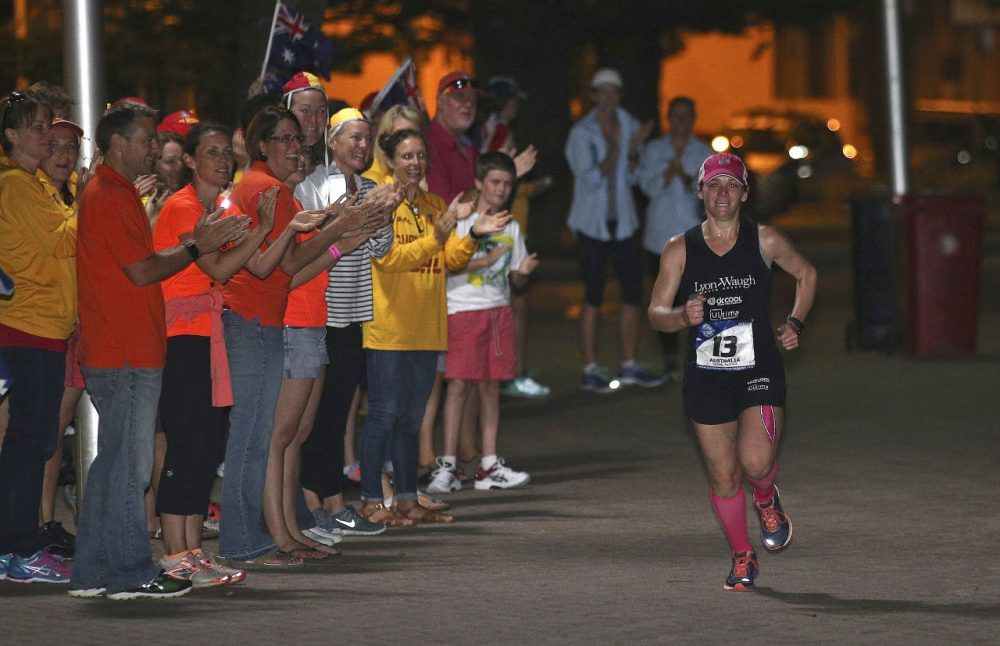
Becca wrote to Richard Donovan, the event director, that she was very, very in, but needed extra time to come up with the $36,000 entrance fee. In 2009, Donovan ran 7 marathons on 7 continents in 4 days, 22 hours, and 3 minutes, handling the logistics himself; he was the first person to run marathons at the North and South Poles; he ran across three continents… And the list goes on. In short, he was the perfect mentor for Becca’s hero’s journey. He gave her the time she needed.

‘I don’t know if I would be the runner and the person I am today if I hadn’t grown up in Boston’
The money came easily: ‘If you reach out, look to those who are in front of you and voice your need, people will help. If you are loyal to them, they will be loyal to you’. Becca recommends not to focus on the big companies because it is hard to connect with CEOs directly. She ended up with sponsorships from Lyon-Waugh Auto Group in Peabody, Massachusetts, Ultima Replenisher, a hydration drink maker, and Dr. Cool, a cooling accessory company. Lululemon and Swiftwick Compression Socks served as her product sponsors. The most important part, however, was securing the support of a different kind.

Every proper hero needs a trusted ally. For Becca, this was her daughter Taylor. She was the first person Becca talked to about the quest: she would never sacrifice their relationship for a run, even a transcontinental one. It was crucial that Taylor backed her up – and she did. They discussed the places contestants would visit, and planned daily Skypes. Later on, at tough races, Becca would sing along to Taylor’s favorite dance songs on her iPod. She went twice to her daughter’s school to talk about the race to the class.
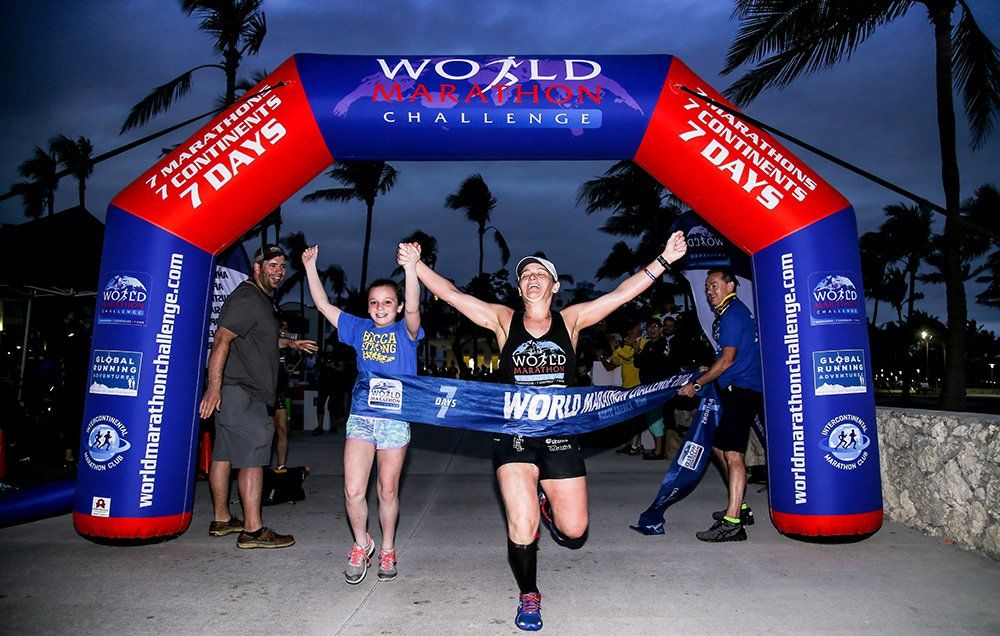
Every proper hero needs a trusted ally. For Becca, this was her daughter Taylor.
Building a training program was a challenge all on its own. Preparation for a race is a delicate process: do not push enough, and you are not at your very best; push too hard, and you will break. This was exacerbated by the fact that she was preparing for the unknown. And for Becca, just doing 'okay' was not enough. She set the bar as high as she could set it. She prepared in the standard parabola scheme, starting out with 40 to 50 miles, then going up until she hit hundred-mile weeks, and tapering in the end. She went to Montreal, Canada to do long runs in preparation for the first marathon on Union Glacier, Antarctica – it was cold in Massachusetts, but she felt she needed to train in negative temperatures (Fahrenheit!), ‘just in case’, to be mentally there. She ran in all hours of the day to be sure she could accommodate running in all conditions. In addition, she did Crossfit and yoga for runners. When the start of the race came, she was ready.

The route for the 2016 edition of the WMC was as follows: Union Glacier, Antarctica → Punta Arenas, Chile → Miami, USA → Madrid, Spain → Marrakesh, Morocco → Dubai, UAR → Sydney, Australia. This was sleeping in airplanes, changing in airport bathrooms, crossing 16 timezones. Becca said that Antarctica was the best and the worst: painfully bright, and so bitterly cold that Becca’s iPod froze. Contestants ran in full winter gear, some used protective tape on their faces. Punta Arenas was a windy, flat and fast course overlooking the Magellan Strait; her friend Jenny came down to run with her. In Miami, Becca had the home course advantage with her friends and family there. And in Sydney, where she made history, her parents were live on Skype watching her finish.
a marathon per day for a week leads to the guaranteed depletion of the body’s resources.
Multiday races have a mixed reputation. For the general public, they are seen as supreme feats of endurance and can easily fill your non-runner friends with reverence and awe: ‘She ran for 7 days! This beast should not be messed with!’ For the running community, the perception is more nuanced. As a category, multiday events are looked down upon by both marathoners and ultramarathoners. The former feel there is not enough intensity; the latter find the separate runs within the event too short. After all, you cannot even get critically dehydrated! My running coach Alexander Elkonin, MD points out that the human body always loses fluids faster than it absorbs them. In multiday races, you can recover your loss in the evening before the next day; in longer ultramarathons, you just keep losing until you start hallucinating. The case is similar with energy sources. Ligaments, tendons, and cartilage take the longest to recover, but a couple of hours rest in between running stages is sufficient for the acute phase of inflammation to pass.

Not all multiday races, of course, are created equal. Marathon des Sables, a six-day, 251 km multi in the Sahara Desert, Morocco, commands deep respect, but the same cannot be said about a race in perfect weather conditions where you log 20-40 km per day.
The WMC is an oddball. It is a multi-day race with the added hurdle of in-plane recovery, and it consists of road marathons where you run, not run-walk, like in most ultramarathons and multi-day events offroad. Elkonin says a marathon per day for a week leads to the guaranteed depletion of the body’s resources. You do restore your energy and water-electrolyte balance. Your neuromuscular transmission – not so much: your mind, even one as disciplined as Becca’s, commands you to run faster, but you just cannot, because your muscles do not get the message. Overuse injuries in muscles, tendons and ligaments mount up as well.
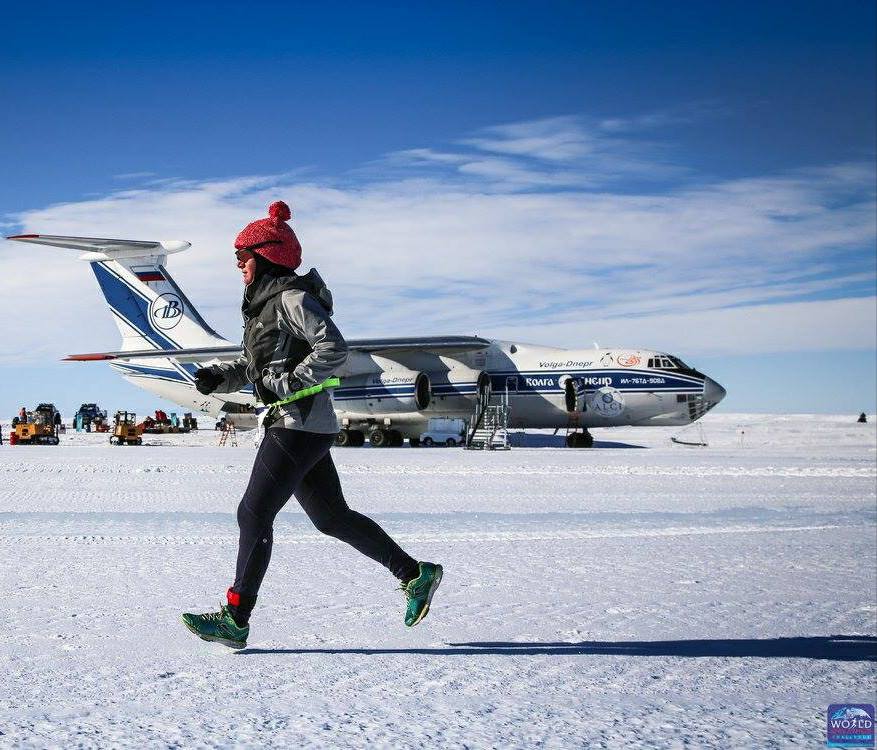
Since the 2018 edition of the WMC, contestants fly on a charter plane with seats reclining into full beds, but in 2016 it was still regular scheduled flights. In the airplane, Becca could not fully rest. Even in training, recovery is a full-time job working on your body. Becca works with the TB12 recovery group, does deep tissue massage, and a lot of foam rolling. In between the WMC races, she made sure to get up and walk around the plane every couple of hours, even though all she wanted, like we all do post-race, was to sleep. She kept her guard up against injury with stretching, pliability, and hydration. She also used air compression pants (these look like the offspring of a spacesuit and a cast).

Day after day of intense road racing is also immensely taxing mentally. But mental conditioning is where Becca excels. Her mantras were ‘mind over matter’ and ‘get comfortable with being uncomfortable’. In Dubai, Becca had her first injury ever – a groin tear, which caused her to run her slowest marathon within the race, at 4:14:41 (her average was 3:55:11). Yet, she still ran the final marathon in Sydney the next day. During the WMC, she kept asking herself: ‘I know you don’t feel good, but are you doing everything you can?’. And then she would step her effort up a few notches and finish strong.
Day after day of intense road racing is also immensely taxing mentally.
Back at Belmont, the welcome was hero-worthy. She returned with a glass trophy for coming in first place, a neat set of seven continent-shaped medals, and a membership in the elite Intercontinental Marathon Club. The town threw a parade in her honor on February the 4th and declared the date to be the “Becca Pizzi Day”. She got to ride in a fire truck. She was paid tribute in the Congressional Record – a big honor for an American citizen. Becca also got to throw the first pitch before the Red Sox game. Before the game, right on the pitcher's mound, she was proposed to by her boyfriend, Joe Stilwel. She said yes and ran that year’s Boston Marathon with the engagement ring on her hand. Last but not least: Moozy’s, the ice cream shop she manages, came up with the ‘Becca7’ ice cream flavor, made of seven ingredients (for inquiring minds, they are: vanilla, cream, milk, chocolate, sugar, graham cracker, and marshmallow). ‘The Antarctica element is easy’, a friend quipped on her Facebook post.
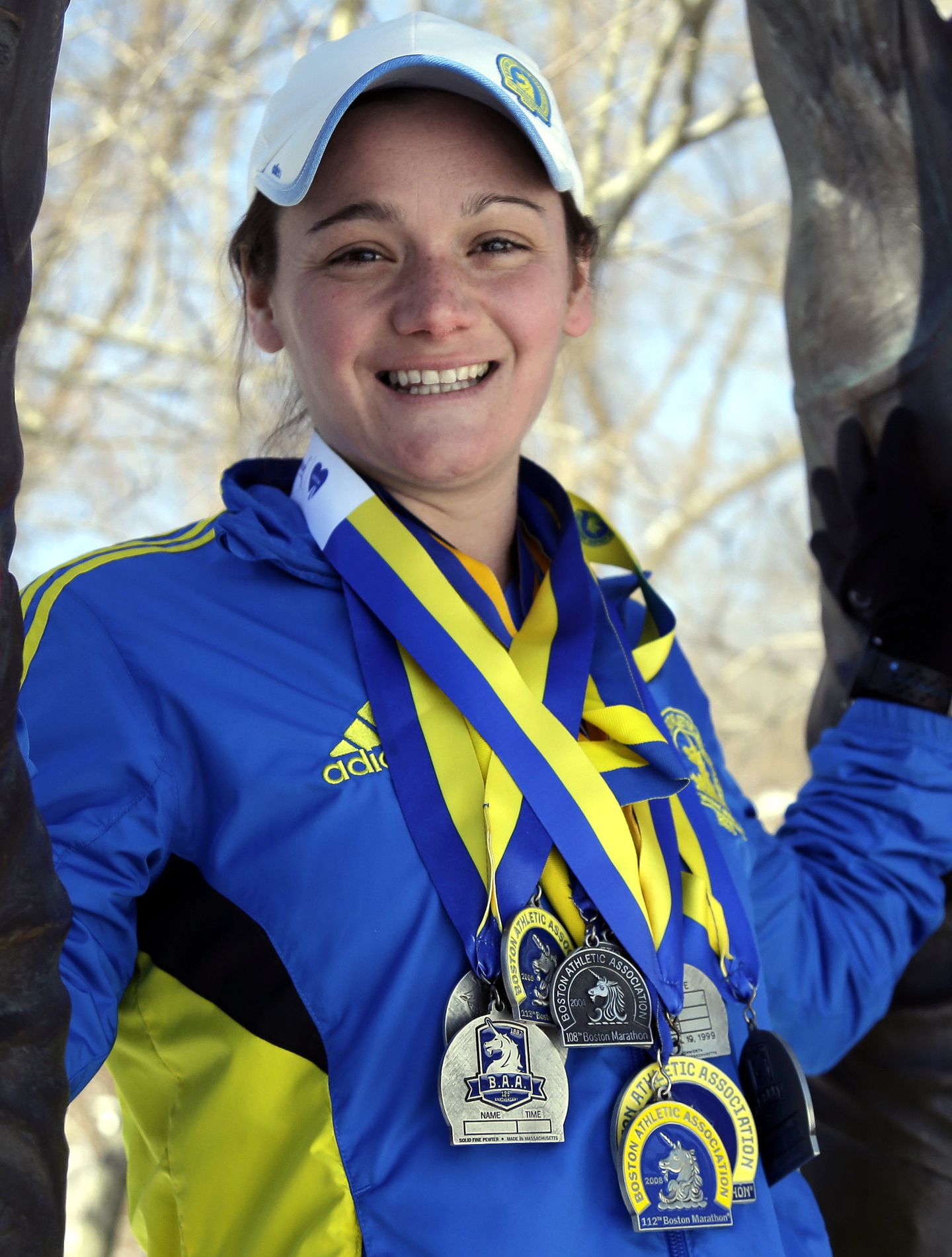
In 2018, Becca had a new dragon to slay. She decided to return to the WMC and become the first person to complete the challenge twice. This time, the preparation was easier. Becca knew what to expect; the training program and gear were all figured out. She was approached by TB12 who helped her train and met her at the finish line of the final race, which in 2018 was in Miami. Taylor joined her mom for the last stretch of the Miami marathon, and Richard Donovan gave medals to both.

In 2018, Becca had a new dragon to slay
‘So what’s next?’ I asked Becca now, in 2020. One day, she would like to organize a marathon, preferably someplace in or near Boston. She’s done another of Richard Donovan’s extreme events: the Volcano Marathon at 4500 meters above sea level. She wants to do the Kona Ironman. She is curious about ultramarathons. But first and foremost, Becca is a marathoner, a runner of a classic and ruthless distance. She is working through her plan to run a marathon in each of the 50 American states. If not for the unprecedented postponing, she would be running the Boston Marathon for the 16th time this April. Becca has never had a marathon not within months in sight, so she understands it will be hard to stay focused now. She will be doing her best to keep her mental game strong with the help of solo runs and her Peloton, a high-tech indoor exercise bike. Would she like to do the WMC again? Yes, but only if she feels fully committed to the race, because Becca Pizzi does not do anything halfway.

After the first WMC, Becca launched the Becca Pizzi 5K road race. ‘...you’ll get the chance to run with a world champion, and you won’t have to leave Belmont’, The Belmontonian wrote in 2016. ‘It’s my baby. I love it.’, she says now, as the registrations are rolling in. I ran the 3rd edition of the race two years ago. The 5K felt friendly and warm, despite the chilly New England weather. I asked a volunteer to point me to Becca. She looked like a busy ball of energy, and yet also appeared small and unassuming.
Last year, I ran a race organized by Lizzy Hawker, another running legend (albeit of a different sport – trail running). She reminded me of Becca Pizzi. Both are centered and composed, but completely devoid of bravado. Somehow, that is all the more inspiring. For Becca, her biggest accomplishments are not the races she does, but people saying she motivated them to run a marathon, to run their first 5K, or to quit smoking. This makes her feel like she has done her job. And this is how humble heroes normalize the heroic.
The first World Marathon Challenge took place in 2015. The current record for the shortest average time among women, set in February 2020, belongs to a Danish runner Kristina Schou Madsenl (3:25:57 hrs), who was the second woman after Becca to participate twice. The next WMC is scheduled for 2022.
Check out the World Marathon Challenge.
Follow WMC:
Facebook: @theworldmarathonchallenge
Instagram: @worldmarathonchallenge777
Follow Becca:
Facebook: @beccapizzi
Instagram: @beccapizzi

2nd best newsletter in the universe